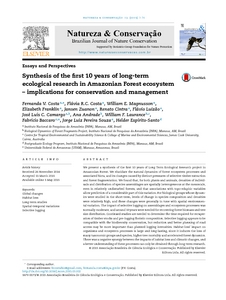Synthesis of the first 10 years of long-term ecological research in Amazonian Forest ecosystem: implications for conservation and management
Costa, Fernanda V., Costa, Flávia R.C., Magnusson, William E., Franklin, Elizabeth, Zuanon, Jansen, Cintra, Renato, Luizão, Flávio, Camargo, José Luís C., Andrade, Ana, Laurance, William F., Baccaro, Fabricio, De Souza, Jorge, and Espírito-Santo, Helder (2015) Synthesis of the first 10 years of long-term ecological research in Amazonian Forest ecosystem: implications for conservation and management. Natureza & Conservação, 13 (1). pp. 3-14.
![[img]](https://researchonline.jcu.edu.au/43353/1.hassmallThumbnailVersion/Costa%20et%20al%20%202015-Amazon%20research.pdf)
|
PDF (Published Version)
- Published Version
Available under License Creative Commons Attribution Non-commercial No Derivatives. Download (900kB) | Preview |
Abstract
We present a synthesis of the first 10 years of Long Term Ecological Research project in Amazonian Forest. We elucidate the natural dynamics of forest ecosystem processes and associated biota, and its changes caused by distinct pressures of selective timber extraction and forest fragmentation. We found that, for both plants and animals, densities of individuals and distribution of species assemblages are spatially heterogeneous at the mesoscale, even in relatively undisturbed forests, and that associations with topo-edaphic variables allow prediction of a considerable part of this variation. For biological groups whose dynamics were studied in the short-term, levels of change in species composition and densities were relatively high, and these changes were generally in tune with spatial environmental variation. The impact of selective logging on assemblages and ecosystem processes was normally moderate, and around 19 years were needed for recovering forest biomass and tree size distribution. Continued studies are needed to determine the time required for recuperation of timber stocks and pre-logging floristic composition. Selective logging appears to be compatible with the biodiversity conservation, but reduction and better planning of road access may be more important than planned logging intensities. Habitat-loss' impact on organisms and ecosystem processes is large and long-lasting, since it induces the loss of many taxonomic groups and species, higher tree mortality and accelerated forest dynamics. There was a negative synergy between the impacts of habitat loss and climatic changes, and a better understanding of these processes can only be obtained through long-term research.
| Item ID: | 43353 |
|---|---|
| Item Type: | Article (Research - C1) |
| ISSN: | 1679-0073 |
| Keywords: | global changes, habitat loss, long-term studies, spatial-temporal variations, selective logging |
| Funders: | Long Term Ecological Research Program (Programa de Pesquisa Ecológica de Longa Duração, PELD) through CNPq, the Program for Biodiversity Research (PPBio) , Coordination for the Improvement of Higher Education Personnel (CAPES), Smithsonian Tropical Research Institute (STRI) |
| Projects and Grants: | Biological Dynamics of the Forests Fragments Project (PDBFF - ST 669) |
| Date Deposited: | 11 Apr 2016 23:39 |
| FoR Codes: | 05 ENVIRONMENTAL SCIENCES > 0502 Environmental Science and Management > 050202 Conservation and Biodiversity @ 100% |
| SEO Codes: | 96 ENVIRONMENT > 9608 Flora, Fauna and Biodiversity > 960899 Flora, Fauna and Biodiversity of Environments not elsewhere classified @ 100% |
| Downloads: |
Total: 920 Last 12 Months: 5 |
| More Statistics |




